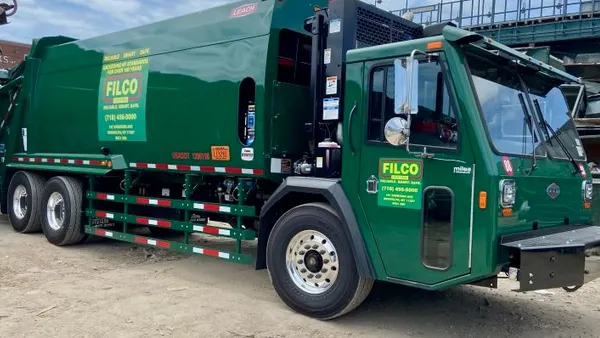Quick Facts
LASAN
-
Director:
Enrique Zaldivar
-
Tons collected/day:
6,650+
-
Diversion rate:
76.4%
Outreach:
LASAN has a staff of approximately 3,000 employees that serve more than 750,000 households.
Biggest initiative:
The city launched the largest commercial waste franchise system in the country, recycLA.
Outlook:
Zaldivar says the city is moving toward "a landfill-free vision."
The expectations put on urban sanitation agencies are growing by the year — and during 2017, the Los Angeles Bureau of Sanitation (LASAN) faced higher stakes than almost any of its big city peers.
Following years of planning, and a final December 2016 city council vote, LASAN launched the largest commercial waste franchise system in the country. Dubbed "recycLA," the system comprises 11 zones serviced by seven companies that are conducting a wholesale overhaul of how commercial and multi-unit residential waste is collected. Many of the more than 70,000 customers in recycLA are now gaining access to comprehensive recycling options for the first time.
By the numbers
State goal of organic waste disposal reduction by 2020 with a 20% food recovery goal by 2025
State goal of recycling by 2020
City goal of diversion by 2030 with a 95% diversion goal by 2035
Setting up this program has meant hiring staff to run a 24-hour customer service center, swapping routes among service providers, delivering new bins and literally going door-to-door for waste assessments. So far, this process has not been universally embraced. Business owners have decried rising collection costs. Local editorials have been tough. A last-ditch lawsuit is ongoing and a ballot initiative is being pursued for November 2018. Service providers in other cities have already begun citing recycLA as a model for why franchising doesn't work.
Yet LASAN maintains that 2017 was always meant to be a transitional year.
"[There are] hiccups every single day that we have to deal with, but we’ll get through all that and we will have a system in place that will benefit every Angeleno. They may not think so yet, but it will," said Dan Meyers, franchise division manager for recycLA.
In response, LASAN Director Enrique Zaldivar recognized there may be ways to improve the marketing but said the data will vindicate this effort starting next year. As for the price spikes, Zaldivar said those are expected to level out once customers begin to fully engage in all of the reduction and diversion options.
For some this could even involve food recovery, one of multiple ways that recycLA's seven service providers are working to meet their contractual waste reduction mandates while supporting California's statewide goals. Those companies are also on the hook for $200 million in infrastructure investments, including new processing capacity for organics and recyclables, as part of the broader benefits recycLA was designed to provide.
Even for the system's fiercest critics, it's hard to deny that this level of proposed transformation, both in terms of how waste companies operate and the pace of infrastructure development, is unique. Zaldivar also believes that this combined scale and knowledge will help Los Angeles weather commodity market shifts better than some of its West Coast neighbors.
Amid this massive recycLA roll-out, LASAN has also been working to keep up with evolving and ambitious state regulatory requirements while eyeing its own local targets. Some of the new projects it has been planning — or already begun — include an in-sink pilot, curbside organics pilot, electric collection truck pilot and the citywide Clean Streets program. That's not even mentioning the agency's duty to operate the largest wastewater treatment system in the U.S. and ensure watershed protection.
Looking Forward
LASAN still has significant work ahead to complete the recycLA transition and address the concerns of upset customers. This process is expected to be done by February, at which point service providers are also on the hook for liquidated damages related to performance issues if needed.
Zaldivar is also watching China, but expects that a strong economy will make his agency's mission even easier in terms of pitching ideas to elected officials and policymakers. He remains fixed on a goal that many cities share, but none have achieved, and believes these combined forces could make it a reality.
"We truly are moving toward a landfill-free vision, and it's no longer just a rhetorical vision," he said. "It's a real vision."









